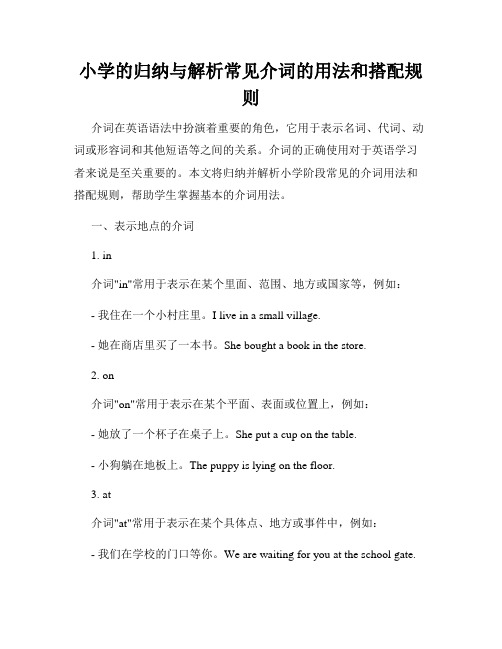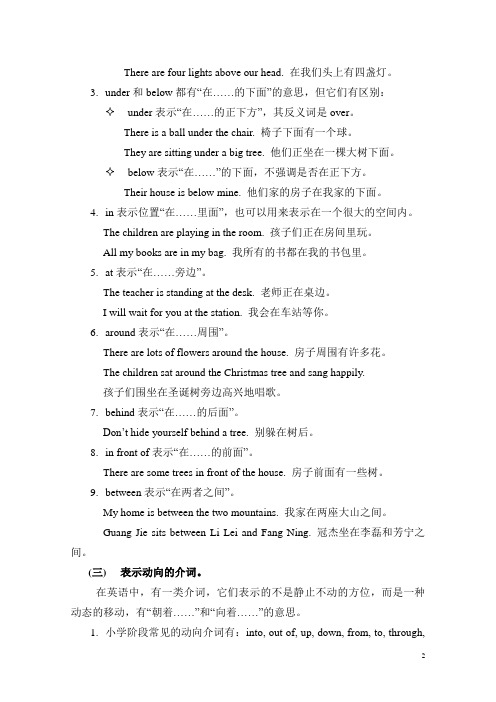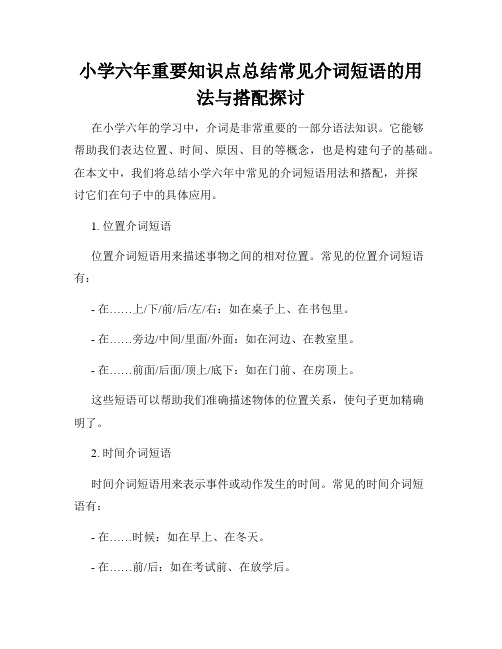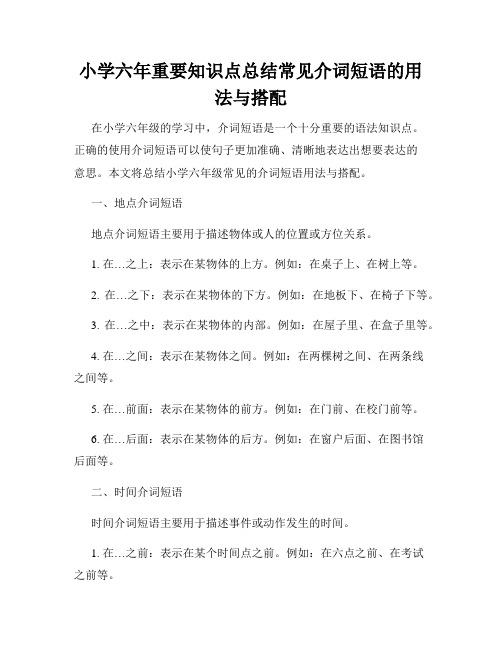小学常用介词的基本用法
小学英语语法知识归纳总结介词

小学英语语法知识归纳总结介词介词是连接名词、代词或其他类似词语与其前面的词之间关系的词。
以下是小学英语中常见的一些介词及其用法:1. in :表示在一些地点或地区e.g. Tom is in the park.(汤姆在公园里。
)2. on :表示在一些表面、平台或日期e.g. The book is on the table.(这本书在桌子上。
)I was born on April 10th.(我出生在4月10日。
)3. at :表示在一些具体的时间、地点或事件e.g. She arrived at the school at 8 o'clock.(她八点到达学校。
)4. from :表示从一些地点、时间或人那里得到或来自e.g. I received a gift from my friend.(我收到了一份来自朋友的礼物。
)5. to :表示目的地或方向e.g. We are going to the beach.(我们要去海滩。
)6. with :表示伴随或使用物e.g. She went to the park with her friends.(她和朋友一起去了公园。
)7. for :表示为了一些目的或对象e.g. I bought a cake for my mom's birthday.(我为我妈妈的生日买了一个蛋糕。
)8. by :表示通过其中一种方式或交通工具e.g. I go to school by bus every day.(我每天坐公交车去学校。
)9. about :表示关于一些话题或主题e.g. We had a discussion about our summer vacation plans.(我们就暑假计划进行了一次讨论。
)10. to :表示直接的动作对象或方向e.g. I gave the present to my best friend.(我把礼物给了我最好的朋友。
小学英语语法-介词

小学英语语法-介词介词的定义介词是一种表示名词或代词与其他词之间关系的词类。
它可以表示时间、地点、方式、原因等关系。
常见的介词以下是小学英语中常见的介词及其用法:in:表示在某个地点或某个范围内。
例如:in the park(在公园里)、in the morning(在早上)。
in:表示在某个地点或某个范围内。
例如:in the park(在公园里)、in the morning(在早上)。
in:表示在某个地点或某个范围内。
例如:in the park(在公园里)、in the morning(在早上)。
on:表示在某个表面或某个特定日期。
例如:on the desk(在桌子上)、___(在星期一)。
on:表示在某个表面或某个特定日期。
例如:on the desk(在桌子上)、___(在星期一)。
on:表示在某个表面或某个特定日期。
例如:on the desk(在桌子上)、___(在星期一)。
at:表示在具体的时间或某个地点。
例如:at 7 o'clock(在7点)、___(在学校)。
at:表示在具体的时间或某个地点。
例如:at 7 o'clock(在7点)、___(在学校)。
at:表示在具体的时间或某个地点。
例如:at 7 o'clock(在7点)、___(在学校)。
to:表示向某个地点或某个目标。
例如:go to the supermarket (去超市)。
to:表示向某个地点或某个目标。
例如:go to the supermarket(去超市)。
to:表示向某个地点或某个目标。
例如:go to the supermarket(去超市)。
from:表示从某个地点或某个时间开始。
例如:___(从星期一到星期五)。
from:表示从某个地点或某个时间开始。
例如:___(从星期一到星期五)。
from:表示从某个地点或某个时间开始。
例如:___(从星期一到星期五)。
by:表示通过某种方式或某个工具。
小学英语介词的用法总结

介词的用法1 .表示地点位置的介词1)at ,in, on, to, forat⑴表示在小地方;(2)表示“在……附近,旁边”in⑴表示在大地方;(2)表示“在.一范围之内”。
on表示毗邻,接壤,“在……上面”。
to表示在……范围外,不强调是否接壤;或“到……”2)above, over, on 在……上above指在……上方,不强调是否垂直,与below相对;over指垂直的上方,与under相对,但over与物体有一定的空间,不直接接触。
on表示某物体上面并与之接触。
The bird is flying above my head. There is a bridge over the river.He put his watch on the desk.3)below, under 在... 下面under表示在…正下方below表示在……下,不一定在正下方There is a cat under the table.Please write your name below the line.4)in front [frant]of, in the front of 在..... 前面in front of…意思是“在……前面”,指甲物在乙物之前,两者互不包括;其反义词是behind (在.. 的后面)。
There are some flowers in front of the house.(房子前面有些花卉。
)in the front of意思是"在…..的前部”,即甲物在乙物的内部.反义词是at the back of…(在……范围内的后部)。
There is a blackboard in the front of our classroom.我们的教室前边有一块黑板。
Our teacher stands in the front of the classroom.我们的老师站在教室前.(老师在教室里)5)beside,behindbeside表示在... 旁边behind表示在... 后面2 .表示时间的介词1)in , on,at 在... 时in表示较长时间,如世纪、朝代、时代、年、季节、月及一般(非特指)的早、中、晚等。
小学的归纳与解析常见介词的用法和搭配规则

小学的归纳与解析常见介词的用法和搭配规则介词在英语语法中扮演着重要的角色,它用于表示名词、代词、动词或形容词和其他短语等之间的关系。
介词的正确使用对于英语学习者来说是至关重要的。
本文将归纳并解析小学阶段常见的介词用法和搭配规则,帮助学生掌握基本的介词用法。
一、表示地点的介词1. in介词"in"常用于表示在某个里面、范围、地方或国家等,例如:- 我住在一个小村庄里。
I live in a small village.- 她在商店里买了一本书。
She bought a book in the store.2. on介词"on"常用于表示在某个平面、表面或位置上,例如:- 她放了一个杯子在桌子上。
She put a cup on the table.- 小狗躺在地板上。
The puppy is lying on the floor.3. at介词"at"常用于表示在某个具体点、地方或事件中,例如:- 我们在学校的门口等你。
We are waiting for you at the school gate.- 她在图书馆参加了一个讲座。
She attended a lecture at the library.二、表示时间的介词1. in介词"in"常用于表示在某个时间段或月份中,例如:- 我在冬天喜欢滑雪。
I enjoy skiing in winter.- 我们将在十二月举办一次聚会。
We will have a party in December.2. on介词"on"常用于表示在某个具体日期或星期几,例如:- 他们将在星期五晚上去看电影。
They will go to the movies on Friday night.- 我的生日是在七月二十一日。
My birthday is on July 21st.3. at介词"at"常用于表示在某个具体时间点,例如:- 晚上九点钟我会在家里等你。
(完整版)小学英语常用介词及用法

常见介词及用法(一)表示时间的介词1.英语里最常见的时间介词有:at, in, on, before, after和from。
2.at , in和on这三个词都表示时间。
✧at主要指具体的钟点:at half past eight 在八点半✧in一般指某一段时间:in January 在一月份✧on指具体在某一天:on Monday 在星期一3.before和after表示时间的先后顺序。
✧before表示“在……之前”。
You should wash your hands before eating. 吃饭前你应该洗手。
✧after表示“在……之后”。
They often play basketball after dinner. 他们放学后经常打篮球。
4.from作时间介词含有“从……开始”的意思,常和to连用,组成“from…to…”的结构,表示“从……到……”的意思。
We go to school from Monday to Friday. 我们从周一到周五上学。
(二)表示方位的介词,也就是表示位置和地点的介词。
1.小学阶段常见的方位介词有:on, in, at, under, over, above, below, about,around, between等。
2.on, over和above这三个词都有“在……上面”的意思,但它们所表示的方位还是有些不同。
✧on表示两个物体的表面相互接触。
如:There is a book on the desk. 桌上有一本书。
The boy is sleeping on the desk. 那个孩子睡在地上。
✧over表示“在……的正上方”,两个物体表面没有接触。
如:There is a light bulb over my head. 在我头顶上有一个灯泡。
✧above表示两个物体中一个在另一个的上方,如:The plane is flying above the clouds. 飞机上云层上飞行。
小学英语常用介词用法

小学英语常用介词用法在学习英语的过程中,掌握介词的正确用法是非常重要的。
介词是连接词与词之间关系的一种词类,它能够表示时间、地点、方式、原因等等。
在小学英语中,常用的介词有很多,下面将为大家介绍一些常用的介词及其用法。
1. in介词"in"用于表示在某个范围内或在某个具体的位置上。
例如:- I live in a house.- There is a book in the bag.2. on介词"on"用于表示在某个表面上。
例如:- The cup is on the table.- The picture is on the wall.3. at介词"at"用于表示在某个点、位置或地方。
例如:- He is waiting at the bus stop.- We will meet at the park.4. by介词"by"用于表示通过某种方式或手段。
例如:- I go to school by bus.- They communicate by email.5. for介词"for"用于表示目的、原因或表示给予的对象。
例如:- This gift is for you.- I study hard for good grades.6. with介词"with"用于表示陪伴或伴随的状态。
例如:- She went to the park with her friends.- He plays basketball with his brother.7. to介词"to"用于表示目的、方向、接触等。
例如:- I go to school every day.- She gives a present to her teacher.8. from介词"from"用于表示出发地、来源或起点。
小学六年重要知识点总结常见介词短语的用法与搭配探讨

小学六年重要知识点总结常见介词短语的用法与搭配探讨在小学六年的学习中,介词是非常重要的一部分语法知识。
它能够帮助我们表达位置、时间、原因、目的等概念,也是构建句子的基础。
在本文中,我们将总结小学六年中常见的介词短语用法和搭配,并探讨它们在句子中的具体应用。
1. 位置介词短语位置介词短语用来描述事物之间的相对位置。
常见的位置介词短语有:- 在……上/下/前/后/左/右:如在桌子上、在书包里。
- 在……旁边/中间/里面/外面:如在河边、在教室里。
- 在……前面/后面/顶上/底下:如在门前、在房顶上。
这些短语可以帮助我们准确描述物体的位置关系,使句子更加精确明了。
2. 时间介词短语时间介词短语用来表示事件或动作发生的时间。
常见的时间介词短语有:- 在……时候:如在早上、在冬天。
- 在……前/后:如在考试前、在放学后。
- 在……期间/过程中:如在假期期间、在学习过程中。
这些短语有助于我们描述事件的发生时间,使句子更加有逻辑和顺序。
3. 原因和目的介词短语原因介词短语用于表示某个动作或状态的原因,目的介词短语则用于表示某个动作的目的。
常见的原因和目的介词短语有:- 因为……所以:如因为下雨所以没有出去玩。
- 为了……:如为了学习而努力。
- 由于……,所以……:如由于病了,所以没有去上学。
这些短语能够帮我们表达出动作和状态之间的因果关系,使句子更加连贯和明确。
4. 其他常见介词短语除了以上提到的常见介词短语外,还有一些其他常见的搭配,如:- 关于……:如关于健康问题。
- 对于……:如对于学生来说。
- 在……之前/之后:如在考试之前、在放学之后。
- 和……一起:如和朋友一起玩耍。
- 靠近……:如靠近公园。
这些介词短语的应用非常灵活,能够丰富句子的表达,使之更加丰富多样。
通过对小学六年的常见介词短语用法和搭配的总结与探讨,我们可以发现介词短语在句子中的重要性和灵活性。
熟练掌握它们的用法,可以帮助我们表达意思更加准确,句子更加地道流畅。
小学六年重要知识点总结常见介词短语的用法与搭配

小学六年重要知识点总结常见介词短语的用法与搭配在小学六年级的学习中,介词短语是一个十分重要的语法知识点。
正确的使用介词短语可以使句子更加准确、清晰地表达出想要表达的意思。
本文将总结小学六年级常见的介词短语用法与搭配。
一、地点介词短语地点介词短语主要用于描述物体或人的位置或方位关系。
1. 在…之上:表示在某物体的上方。
例如:在桌子上、在树上等。
2. 在…之下:表示在某物体的下方。
例如:在地板下、在椅子下等。
3. 在…之中:表示在某物体的内部。
例如:在屋子里、在盒子里等。
4. 在…之间:表示在某物体之间。
例如:在两棵树之间、在两条线之间等。
5. 在…前面:表示在某物体的前方。
例如:在门前、在校门前等。
6. 在…后面:表示在某物体的后方。
例如:在窗户后面、在图书馆后面等。
二、时间介词短语时间介词短语主要用于描述事件或动作发生的时间。
1. 在…之前:表示在某个时间点之前。
例如:在六点之前、在考试之前等。
2. 在…之后:表示在某个时间点之后。
例如:在晚饭之后、在假期之后等。
3. 在…期间:表示在某个时间段内。
例如:在假期期间、在夏天期间等。
4. 在…时候:表示在某个特定时刻。
例如:在早上时候、在下雨时候等。
5. 在…日期:表示在某个日期。
例如:在生日日期、在圣诞节日期等。
三、方式介词短语方式介词短语主要用于描述某个动作或状态的方式或方式。
1. 以…方式:表示使用某种方式。
例如:以快速的方式、以友好的方式等。
2. 通过…方式:表示通过某种方式。
例如:通过努力的方式、通过讨论的方式等。
3. 用…方法:表示使用某种方法。
例如:用书写的方法、用计算的方法等。
4. 以…方法:表示以某种方法进行。
例如:以跳舞的方法、以游泳的方法等。
四、目的介词短语目的介词短语主要用于描述某个行为的目的或目标。
1. 为了…而:表示为了达到某个目的。
例如:为了学习而努力、为了健康而锻炼等。
2. 为了…目的:表示为了实现某个目标。
例如:为了考试目的、为了运动目的等。
- 1、下载文档前请自行甄别文档内容的完整性,平台不提供额外的编辑、内容补充、找答案等附加服务。
- 2、"仅部分预览"的文档,不可在线预览部分如存在完整性等问题,可反馈申请退款(可完整预览的文档不适用该条件!)。
- 3、如文档侵犯您的权益,请联系客服反馈,我们会尽快为您处理(人工客服工作时间:9:00-18:30)。
常用介词的基本用法at①表示时间:I go to school at seven every day 我每天早上7点去上学。
②表示在某一具体地点:He is standing at the bus stop 他站在公共汽车站。
③表示动作的方向、目标:Let me have a look at the picture 让我看看这幅图。
④用于某些固定搭配:at once 立刻、马上at last 最后at the same time 同时at first 开始时not at all 一点也不about①表示大约时间:I's about six o'clock now. 现在大约6点钟了。
②表示地点;在……周围:Everthing about me is so beautiful 我周围的一切都那么美好。
③关于,对于:We are talking about the news. 我们正在谈论新闻。
after①在……之后:After dinner I watch TV. 晚饭后我看电视。
②在……后面:He came into the room after me. 他在我后面进了房间。
behind①在……之后:There is a bike behind the tree. 树后有一辆自行车②比……晚,迟于:The train is behind time. 火车晚点了by①在……旁:He is sitting by the bed. 他正坐在床边。
②到……时候:We have learned three English songs by now. 到现在为止,我们已经学会了三首英文歌曲。
③以……方式:I go to school by bus. 我乘公共汽车去上学。
④用于某些固定搭配:one by one 一个接一个by the way 顺便说一句for①为,给,替:I'll make a card for my teacher. 我要给老师做卡片。
②由于:Thank you for helping me. 你帮我。
③表示给(某人)用的:There is letter for you. 这儿有你一封信。
in①在……里面:The pencil is in the desk. 铅笔在课桌里。
②在一段时间里:We have four classes in the morning. 我们上午有四节课。
③用,以:What's this in English? 这用英语怎么说?④在某一年份,季节,月份:in 2002, in spring, in January⑤表示状态,服饰:Helen is in yellow. 海伦身穿黄色衣服。
⑥在……方面:He is weak in English. 他的英语不行。
⑦用于某些固定搭配:in front of 在……前面in the end 最后in time 及时like①像……样:He looks like his father. 他像他的父亲。
②这样,那样:Don't look at me like that. 别那样看着我。
③怎样:What's the weather like? 天气怎样。
near靠近,在……附近:My bed is near the window. 我的床在窗户旁。
of①的(表示所属关系):This is a photo of my family. 这是一我家的照片。
②……的(用于所有格):He is a friend of mine. 他是我的一个朋友。
③表示数量(与连词连用):One of us is from Beijing. 我们中有一个来自④想到,谈到:I often think of them. 我常常想到他们。
⑤用于某些固定搭配:of course 当然because of 因为,由于on①在……上面:There are some apple on the tree. 树上有些苹果。
②在(星期)天,在某天的上午(下午,晚上):They go to English class on Sunday. 星期天他们去上英语课。
I left Beijing on the morning of May 1. 我在5月1日早上离开。
③用于某些固定搭配:on duty 值日on time 准时over①在……正上方:There is a lamp over the table. 桌子上方有一盏灯。
②遍及,穿过:There is a bridge over the river. 有座桥横跨那条河。
③超过,不止:She is a little over 2. 她两岁多了。
to①到,往,向:He walks to the window. 他走向窗户。
②表示时间、数量,到……为止Please count from ten to thirty. 请从10数到30.③向,对,给:Happy New Year to you all. 大家新年好。
underWhat's under your desk? 你书桌底下是什么?with①和,写:Could you go home with me? 你能和我一起回家吗?②表示伴随状态,带有:Who's that girl with glasses? 那位戴眼睛的女孩是谁?( )1.___ the afternoon of May, we visited the old man.A. OnB. AtC. In( )2.Many people work ___ the day and sleep ___ night.A. on ; atB. in ; inC. in ; at( )3.He speaks Japanese best ____ the boy students.A. betweenB. withC. among( )4.A wolf ___ a sheep skin is our dangerous enemy.A. withB. inC. on( )5.Joan hopes to come back ___ three days.A. afterB. forC. in( )6.They sent the letter to me ___ mistake.A. byB. forC. with( )7.He left home ___ a cold winter evening.A. atB. onC. in( )8.Shanghai is ____ the east of China.A. inB. onC. to( )9.____ my father’s help, I have fi nished my composition.A. UnderB. OnC. with( )10.He’s very strict ____ himself and he’s very strict ___ his work.A. with ; inB. in ; withC. with ; with( )11.I really can’t agree ____ you.A. toB. onC. with( )12.The shop won’t open ___ nine in the morning.A. untilB. atC. during( )13.How about ___ the flowers now?A. wateringB. are wateringC. watered( )14.She spent all his money ___ books.A. inB. withC. on( )15.They are talking ___ low voices.A. withB. inC. on( )16.It’s very kind ___ you to help us.A. forB. toC. of( )17.What will you have ___ breakfast this morning?A. withB. forC. by( )18.A plane is flying ____ the city.A. onB. overC. above( )19.You are free to speak ___ the meeting.A. atB. inC. on( )20.Mr. Green will stay in China___ Friday.A. toB. onC. till( )21.It’s wrong to play jokes ___ other people.A. onB. ofC. with( )22.Which color do you like? I prefer blue ___ red.A. forB. asC. to( )23.The student will give us a talk ___ how to use our spare time.A. forB. onC. in( )24.I paid two hundred yuan ___ that kind of bicycle.A. inB. forC. on( )25.The doctor is very kind ___ his patientsA. toB. onC. at( )26.We can’t live ___ air.A. inB. withC. without( )27.The child was afraid ___ the strange sound.A. atB. forC. of( )28.He was very angry ___ her for being late.A. forB. withC. at( )29.What do you think __ _ the play?A. aboutB. likeC. of( )30.I think it’s the right way to work out the problem, but I am notsure _____ it.A. doB. aboutC. of( )31.Reading ___ the sun isn’t good _ __ youA. under ; forB. in ; forC. in ; to( )32.I won’t ask about it, I’m going to see it ___ _ my own eyes.A. byB. forC. with( )33.We go to school every day _ ___ Sunday.A. exceptB. withoutC. on( )34.There is a small river ___ the two townsA. inB. betweenC. among( )35.Li Lei sometimes falls asleep ___ the lesson.A. forB. throughC. during( )36.Mr. Black went to Paris ___ a few days.A. forB. inC. after( )37.They will leave ________ London next month.A. toB. fromC. for( )38.Are you going to the zoo __ _ bus or ___ my car?A. on ; byB. by ; inC. on ; in( )39.He woke up several times _ __ the nightA. inB. atC. on( )40. We traveled overnight to Paris and arrived _______ 5 o’clock ______ the morning.A. on; inB. at; inC. at; onD. in; on( )41. Where’s Lily? We are all here _______ her.A. besideB. aboutC. exceptD. with( )42. She sent her friend a postcard _______ a birthday present.A. onB. asC. forD.( )43. Jack has studied Chinese in this school ______ the year of 2000.A. sinceB. inC. onD. by( )44. ---What is a writing brush, do you know?---It’s _______ writing and drawing.A. withB. toC. forD. by( )45. English is widely used ______ travellers and business people all over the world.A. toB. forC. asD. by( )46. _____ the help of my teacher, I caught up with the other students.A. UnderB. InC. WithD. On( )47. Hong Kong is ______ the south of China, and Macao is ______the west of Hong Kong.A. in; toB. to; toC. to; inD. in; in( )48. ---You’d better not go out now. It’s raining.---It doesn’t matter. My new coat can keep ______ rain.A. inB. ofC. withD. off( )49.There are many apples ___ the tree. A bird ___ the tree is picking an apple.A. in ; onB. on ; inC. in ; at( )50. “Who are you going to play ____?” “Grade Two.”A. aboutB. byC. against。
